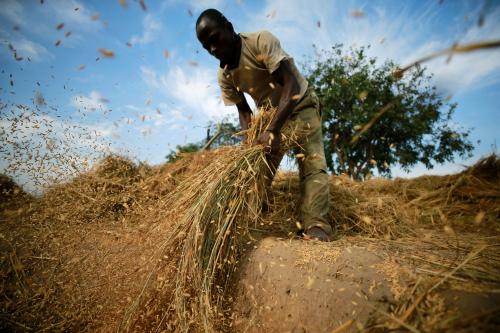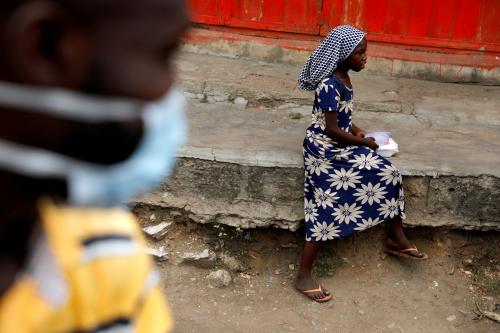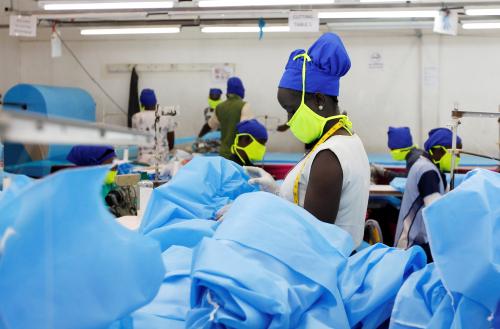Lesotho’s Prime Minister Thabane to resign amid suspected scandal
This week, a spokesman for Lesotho Prime Minister Thomas Thabane announced that Thabane will resign from his position by May 22. The announcement came after Thabane’s coalition partners—including Thabane’s own All Basotho Convention, as well as two additional parties from the coalition of four—withdrew their support in parliament for his government. Thabane’s party has nominated Finance Minister Moeketsi Majoro as his successor; all parties have provisionally agreed to this nomination.
Thabane’s resignation will bring an end to a political crisis triggered by Thabane’s alleged involvement in the 2017 murder of his ex-wife. Thabane has been questioned but has yet to be formally charged in the case. His current wife, Maesaiah Thabane, who has also been accused of involvement in the murder, has been charged. Both Thabane and his current wife have denied the allegations: In an interview with AFP, Thabane stated that he is resigning only due to his old age. Thabane did, however, request immunity from prosecution after leaving office; this request was rejected last week by the governing party.
Complications arise as Burundi and Malawi plan elections
Days before its May 20 election, Burundi has expelled an expert World Health Organization (WHO) team from the country, according to a foreign ministry letter obtained by the Associated Press. The team includes the WHO’s top country official, its country coronavirus coordinator, its head of communicable diseases for the country, and a laboratory expert focused on COVID-19 testing. The letter did not offer an explanation for the ousting.
This is not first time Burundi has distanced itself from intergovernmental organizations. Last year, it forced the closure of the U.N. human rights office following four years of halted cooperation, during which period it also shut down four other regional U.N. offices. In 2017, it became the first country to formally withdraw from the International Criminal Court since the court’s inception in 2002.
The current president, Pierre Nkurunziza, has promised to transition out of office after this election with General Evariste Ndayishimiye standing as the ruling party’s candidate. Notably, the 2015 election was mired in violence that resulted in 1,200 dead and 400,000 displaced.
Last week, Malawi’s Supreme Court upheld a previous ruling that the 2019 general election was marked by irregularities, setting up a new election due to take place no later than July 3. The ruling also affirms that no new candidates may join the race, that the winning candidate must receive an absolute majority (Peter Mutharika, the leading vote-getter in 2019, received 38 percent of the vote), and that only those registered to participate in the previous election may vote.
It remains unclear how the ruling will impact the electoral pact formed in March by the two runners-up of last May’s nullified election. The new election is tentatively scheduled for July 2, though no final decision has been made about opening polls during the COVID-19 pandemic.
Some African countries begin to open up while others see cases of COVID-19 increase
On May 13, Senegal began to ease restrictions despite a 30 percent jump in cases the previous day. In addition to a shortened curfew, places of worship can reopen, and businesses, previously restricted from opening on certain days, can now remain open for six, but must close once a week for cleaning. Côte d’Ivoire is also loosening restrictions, ending the curfew in Abidjan, but keeping nightclubs, bars, and movie theaters closed. Schools in the country are set to reopen on May 25.
Also this week, Algeria announced it will be producing rapid test kits, which can return results in 15 minutes, at a laboratory in Algiers that can turn out 200,000 test kits per week. Meanwhile, Tunisia, which has seen a decline in cases, announced on Sunday it had recorded no new cases. Though the North African country saw very few cases in the beginning of the pandemic, it closed its schools, places of worship, and nonessential shops in mid-March and began reopening in late April.
Still, many countries face major hurdles: In Nigeria, where restrictions have begun to loosen, failure to adhere to social distancing has led authorities to threaten reinstating lockdown measures, especially in Lagos. Djibouti extended its restrictions to May 17 despite plans from earlier this month to ease them. Relative to its population, Djibouti has been the hardest-hit country on the continent, though those numbers may be skewed due to its comparatively widespread testing.
Meanwhile, Chad is only starting lockdowns in its largest cities. So far, a curfew will be in place between 8 p.m. and 5 a.m., and travel between different urban areas will be banned for two weeks, though vehicles carrying various goods will be allowed entry between 10:00 p.m. and 5 a.m. Though the country has seen 253 confirmed cases and 27 deaths, authorities believe the numbers to be much higher due to lack of testing.
On Thursday, South Sudan registered its first COVID-19-related death, while reports continue to filter in that the disease has reached some heavily populated camps for displaced people. As of this week, all African countries have confirmed cases of coronavirus, after Lesotho reported its first case on Wednesday.
Confusion over the status and spread of COVID-19 in Tanzania continued this week as the opposition complained of a weeks-long delay in updated numbers and have expressed suspicion that those official numbers are far too low as reports of nighttime burials increase.
Overall, as of this writing, Africa has registered 75,866 cases and 2,570 deaths.
The Brookings Institution is committed to quality, independence, and impact.
We are supported by a diverse array of funders. In line with our values and policies, each Brookings publication represents the sole views of its author(s).








Commentary
Africa in the news: Lesotho, Burundi, Malawi, and COVID-19 updates
May 16, 2020